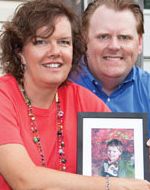Evan Lindberg: Neuroblastoma

A message from Wendy and Gavin Lindberg, Evan’s parents:
“Evan has a very rare, very aggressive pediatric cancer called neuroblastoma. There is no guarantee of success with any course of treatment. We will do the best we can, but you should prepare for a very long and difficult journey.”
Those were the words of the pediatric oncologist who diagnosed our only child Evan with stage IV neuroblastoma in 2006. Evan was three years old. The phrase “long and difficult journey” does not even begin to describe what Evan endured over the course of the next four years.
Neuroblastoma is a cancer of the sympathetic nervous system that primarily strikes young children before the age of 5. Approximately 700 cases a year are diagnosed in the U.S. Evan’s disease classification was the worst of the worst – stage IV, with amplification of the N-myc gene. Fewer than 40% of children with this specific diagnosis survive for longer than five years.
With the shock of diagnosis still overwhelming, we set out to find the treatment plan that would give Evan the best chance. We quickly learned that opinions varied widely on this subject, particularly among the experts. With no definitive cure, we were left to make the hard choices. We were constantly searching for the magic bullet that would put an end to our nightmare. Of course, there were no magic bullets, particularly after Evan relapsed less than a year into treatment.
Phase I and Phase II clinical trials became our standard of care as we tried to beat back Evan’s cancer while maintaining some quality of life. “Home” became one of three places: Children’s National Medical Center in Washington, D.C., Memorial Sloan-Kettering Cancer Center in New York and Children’s Hospital of Philadelphia. All totaled, Evan relapsed seven times, five of which were in the brain. Each time, he amazed us and his doctors with his resolve to keep going.
No child should ever have to endure what our son endured: seven surgeries, over 150 toxic chemotherapy treatments, 25 excruciatingly painful courses of immunotherapy, months of intense radiation therapy and an endless stream of CTs, MRIs, bone scans, blood draws, shots and other grueling procedures, all resulting in over 100 nights in the hospital. Pain, nausea and discomfort were constant companions. Toughness and resolve were Evan’s response.
One treatment in particular stands out: 3F8, an immunotherapy that he received at Memorial Sloan-Kettering Cancer Center. “Controlled torture” is one way to describe this antibody treatment that left Evan screaming in pain for 30 minutes, until his “rescue” narcotics kicked-in and he passed out. The rest of the day was a mixture of lingering pain and lethargy until we returned the next morning to do it all again.
Evan’s story is important because it reminds us of the urgency that is needed in the fight against pediatric cancer. While five-year survival rates for children with cancer (age 0 to 14 years) approach 80%, there are certain pediatric cancers, such as neuroblastoma, where the survival rates are very poor. Therefore, we call on Congress to provide the resources necessary to the National Cancer Institute to remove cancer as the leading cause of death from disease among children.
Although we lost Evan to neuroblastoma in October of 2010, neuroblastoma did not define him. Neuroblastoma never stood a chance with Evan. He survives in the hearts of everyone he met. It is in Evan’s memory that we have dedicated ourselves to finding better treatments and a cure for this devastating disease. To learn more, please visit Evan’s Victory Against Neuroblastoma Foundation, at www.theevanfoundation.org.